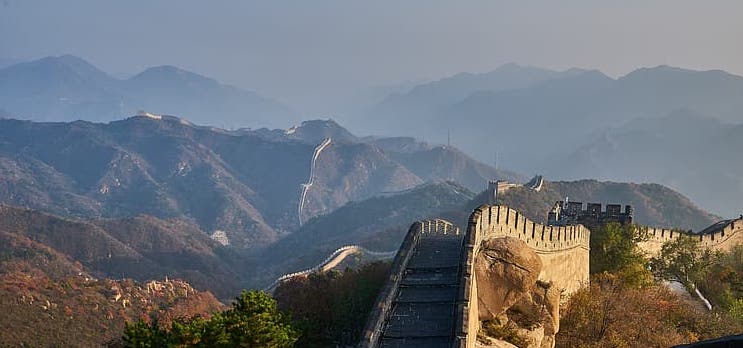Fifth in the Lenten Series, “Why Did Jesus Die?”
The first time I stood on the Great Wall of China was a revelation. I thought I knew what it was. I remember in elementary school, a teacher said that the Great Wall of China was the one human-made structure you could see from space. It turns out this is not at all true, for more than one reason. But it sounded amazing to me, that people could make something so large and so big. I’d seen many, many pictures over the years after that, of the wall and the verdant, mountainous scenery surrounding it. I had even read bits of history about the great Qin dynasty and Emperor Qin Shi Huang, under whose brutal but powerful rule the wall construction really gathered momentum.
I thought I knew the Great Wall of China.
But standing there for the first time, on a summer day at the start of this millenium, I was speechless. It was larger and steeper than I had imagined. Even on a grey, rainy morning, the views from its peaks were more breathtaking than I had expected. I knew that this wall was long, but seeing it wind through the distant mountains, I just remember having this extraordinary sense of awe at what natural beauty, human engineering, back-breaking labor, and historical preservation had together made possible.
Thanks for reading about my relationship with the Great Wall. In this year of endless cancellations, the most painful for me was the cancellation of our family’s plans for our kids’ first ever trip to China. Our family is a beautiful interracial mix of my wife’s family’s Chinese roots and my family’s mix of Northwest European heritage, and our kids are all teenagers and getting ready to head out into the world on their own soon. The biggest thing we wanted to do together first was to go to China. And a clear must-see for all was the kids’ first trip to the Great Wall themselves.
There’s a reason, though, that I tell this story as we explore why Jesus died. Most sane people throughout history have acknowledged that when it comes to our thinking about our Creator, the Spirit or being above or within all things, some humility is called for. We have rightly viewed who or what we call God with mystery.
And yet, we have often assumed that more or less, we know what God is like. By way of vision or tradition, story and rumor, we have imagined that the force behind the sun and the rain, life and death, our great hopes and fears, to be called God. We have, our human family, called God the creator, the power behind all power, the cause beneath all causes, the force of life that has brought all life into being. And it’s not that none of this is true. But our sense of God has remained murky and far too often a cosmic reflection of the best and the worst of our own muddled conceptions and experience of love, power, fear, and violence.
Something interesting happened, though, in the collective thoughts and imaginations of the first followers of Jesus. Their memory of the life and teaching of Jesus, how Jesus provoked and inspired them, and even how their sense of the unseen Spirit of Jesus continued to move them, made them think that for the first time, people had seen God face to face. God had walked among them, spoken to them, and shared meals of bread and beans and fish with them.
God looked like Jesus.
They said this in different ways. Here are three, just as a sampling, all from the late Eugene Peterson’s poetic translation he called The Message.
“No one has ever seen God,
not so much as a glimpse.
This one-of-a-kind God-Expression,
who exists at the very heart of the Father,
has made him plain as day.” (John 1:18)
No one had ever seen God, until Jesus made God plain as day.
“We look at this Son and see the God who cannot be seen. We look at this Son and see God’s original purpose in everything created.” (Colossians 1:15)
In the history of the earth, the human species has been the closest approximation of the creative mind and vibrant love that God is. In Jesus, this approximation becomes the real deal, the accurate reflection of God, the original purpose.
“We heard it with our own ears, saw it with our own eyes, verified it with our own hands. The Word of Life appeared right before our eyes; we saw it happen! And now we’re telling you in most sober prose that what we witnessed was, incredibly, this: The infinite Life of God himself took shape before us.” (I John 1:1-2)
We now have an eyewitness sighting of the infinite life of God. God looks like Jesus.
In their hope that God looks like Jesus, his followers to this day are not limited to how Jesus died, but our vision does continue to center there. Because in Jesus’ death, we see what the best writing and worship about God had always hoped might be true: that God is self-giving, radically forgiving, co-suffering love.
God shares and gives all the best that God has and is. God is by nature kind and forgiving, eager to see the best and heal the worst in us. And God is present in compassion with all who suffer.
Jesus on the cross then becomes a kind of litmus test for all of our screwy traditions, opinions, hopes, and fears about God. Does what our parents or church or anyone else told us about God look and sound like Jesus? Maybe then it is. But if not, we can forget about it.
This is another reason then that Jesus died, to cut through the pile of rumor and report of all we have thought about God, and to show us what God is like: self-giving, radically forgiving, co-suffering love.











